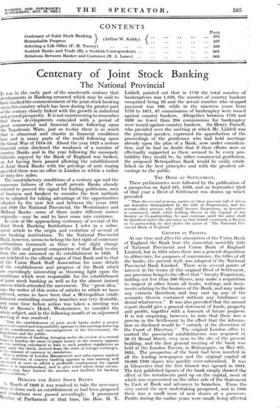Centenary of Joint Stock Banking
The National Provincial
IT was in the early part of the nineteenth century that developments in Banking occurred which may be said to have marked the commencement of the joint stock banking era in this country which has been during the greater part of the century closely linked with the growth in industrial and general prosperity. It is not uninteresting to remember that these developments coincided with a period of great commercial and financial strain following upon the Napoleonic Wars, just as to-day there is so mnch that is abnormal and chaotic in financial conditions here and in many parts of the world following upon the Great War of 1914-18. About the year 1825 a serious financial crisis disclosed the weakness of a number of country Banks and in the year following the monopoly hitherto enjoyed by the Bank of England was broken, an Act having been passed allowing the establishment of Joint Stock Banks with the privilege of note issuing provided there was no office in London or within a radius of sixty-five miles. The unsatisfactory conditions of a century ago and the numerous failures of the small private Banks already referred to proved the signal for leading politicians, men of business and bankers to consider the best methods to be adopted for taking advantage of the opportunities afforded by the new Act and between the years 1831 and 1836 the National Provincial, the Westminster and Midland Banks—some of them under different names originally—may be said to have come into existence.
In view of the approaching centenary of several of the Joint Stock Banking Institutions I refer in a subse- quent article to the origin and evolution of several of our banking institutions. To the National Provincial Bank, however, seems to belong the first right of centenary celebrations inasmuch as there is but slight change in the title and general composition of that Bank to-day from the one assumed on: its establishment in 1833. I am indebted to the official organ of that Bank and to that of the Union Bank Staff Association for some details of the establishment and progress of the Bank which are exceedingly interesting as throwing light upon the conditions which were responsible for the establishment of joint stock banking as well as for the almost instant success which attended the movement. The " great idea," says the writer of this series of articles to which we have referred, seems to have been that a Metropolitan estab- lishment controlling country branches was very desirable, and some time before action was taken a meeting was held at Brown's Hotel, Westminster, to consider the whole subject, and in the following month at an adjourned meeting it was resolved :
" That the establishment of joint stock banks under a proper system of control and responsibility appears to this meeting deserving of the consideration and encouragement of the Government, the Legislature and the public.
That a system of banking, bringing under the review of a central beard in London- the issue of paper money in the country appears at this meeting calculated to lead. to such prudent regulations as may apply the check, derived from the state of foreign exchanges, to the amount of currency in circulation. That a system of London Management and subscription applied to the direction of country banking appears to this meeting well calculated at once to afford a profitable employment for capital where it is superabundant, and to give relief where local circum- "lees may have limited the amount and facilities for banking accommodation."












































 Previous page
Previous page